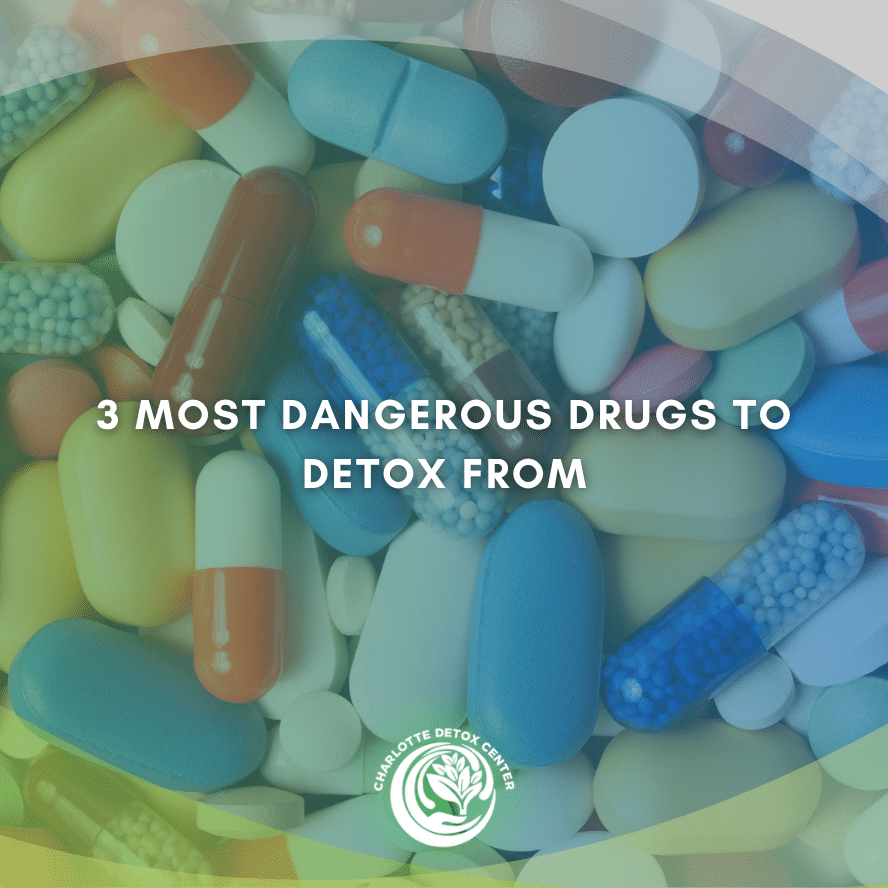3 Most Dangerous Drugs to Detox From

Medically Verified: 2/1/24
Medical Reviewer
Chief Editor

All of the information on this page has been reviewed and verified by a certified addiction professional.
Deciding to sober up takes courage and dedication because it certainly isn’t easy. Substances that are physically addictive cause negative physical and psychiatric side effects when they are suddenly removed from the system after months or years of abuse. These negative side effects are known as withdrawal symptoms and they can range from mild or moderate to severe and life-threatening. People suffering from addiction often view withdrawal as the first obstacle they must overcome to achieve sobriety.
Drug withdrawal and detox can be dangerous, especially if you don’t seek medical support and supervision. Medical detox centers prescribe medications, monitor vitals, and provide supportive care to keep patients safe and comfortable during the withdrawal period.
Most Dangerous Drugs to Detox From
Many people believe that opioids are the most dangerous drugs to detox from, but this isn’t true. Opioid withdrawal is painful and agonizing, but it typically is not life-threatening. Withdrawal from other drugs, though, can be.
Here are the three most dangerous drugs to detox from.
1. Alcohol
Alcohol is the most widely abused substance in the United States. More than 14.5 million people ages 12 and older have an alcohol use disorder (AUD).[1] Because so many people drink alcohol–and because it is legal for purchase as long as you are over the age of 21–many people underestimate how dangerous this substance really is.
The truth is that alcohol is the most dangerous drug to detox from because it can provide severe and potentially fatal side effects. Some of the most serious symptoms of alcohol withdrawal include:
- Panic attacks
- High blood pressure
- Shakes and tremors
- Seizures
- Heart attack
- Stroke
- Coma
While each of these symptoms is concerning, the most extreme form of alcohol withdrawal is known as “delirium tremens.” Delirium tremens (DTs) is characterized by an altered mental status and an overactive central nervous system. This causes symptoms like shaking, confusion, hallucinations, agitation, cardiovascular collapse, and seizures.
About 3-5% of people with AUD will experience DTs. Nearly 37% of DT cases are fatal.[2]
2. Xanax (Alprazolam) and Other Benzodiazepines
Another drug that is dangerous to detox from without medical support is . Xanax is a benzodiazepine medication that can be prescribed for the treatment of anxiety and panic disorders, but it is also a popular drug of abuse.
Benzodiazepines work by increasing the reuptake of gamma-aminobutyric acid (GABA), a neurotransmitter that regulates the central nervous system (CNS). When a person who is dependent on benzos like Xanax suddenly stops taking them, the CNS goes into an excitatory state resulting in rebound symptoms of anxiety.
Common symptoms of benzodiazepine withdrawal include:
- Sleep disturbances
- Anxiety
- Sweating
- Panic attacks
- Heart palpitations
- Tremors
- Changes in perception
These symptoms can be uncomfortable but are not considered serious. However, benzo withdrawal can lead to serious, life-threatening complications, including:
- Hallucinations
- Seizures
- Psychosis
- Psychotic reactions
- Self-harm
- Suicidal thoughts and actions
3. Barbiturates
Another group of drugs that are dangerous to detox from is barbiturates. This class of drugs is used to treat sleep disorders, psychosis, seizure disorders, and some mental health conditions like anxiety. Barbiturates were largely replaced by benzodiazepines in the 1960s, but they still exist and can lead to physical dependence and withdrawal.
Barbiturate withdrawal is very similar to benzo withdrawal. Symptoms include:[3]
- Nausea and vomiting
- Anxiety
- Panic attacks
- Psychosis
- Tremors
- Shakes
- Increased heart rate
- Insomnia
- Seizures
- Coma
Without medical treatment, barbiturate withdrawal can be deadly.
How to Detox Safely and Comfortably
Detoxification is the first step toward sobriety, but it is not an easy step to take. While you may be tempted to try and detox on your own or treat withdrawal at home, doing so can be dangerous and life-threatening. Instead, the safest way to detox from alcohol, benzodiazepines, and barbiturates is to seek medical care.
Drug and alcohol detox facilities exist to guide people struggling with addiction through detox and into treatment. Doctors can prescribe medications that alleviate symptoms of withdrawal. For example, alcohol withdrawal is treated with benzodiazepines, benzodiazepine withdrawal is managed using a slow taper, and barbiturate withdrawal can be managed with supportive care.
Throughout detox, nurses are responsible for monitoring your vitals and evaluating your symptoms to ensure your safety. Many detox centers also provide healthy meals and hydrating beverages to help stabilize you further.
Once your symptoms subside, a substance abuse counselor will help you develop a plan for continued care that involves either inpatient or outpatient rehab. Rehab is designed to address the root cause of your addiction so you can stay sober and avoid having to go back to detox again.
Get Connected With a Drug and Alcohol Detox Center in Charlotte, North Carolina Today
Charlotte Detox Center bridges the gap between the luxury and comfort of your home with the safety and medical supervision of a hospital. Our exclusive, private facility in Charlotte, North Carolina is an ideal place to begin your journey of recovery. Our highly trained medical and clinical staff are able to manage your physical symptoms and discomfort while providing you with encouragement and emotional support.
Don’t wait any longer. Call now to get started.
References:
